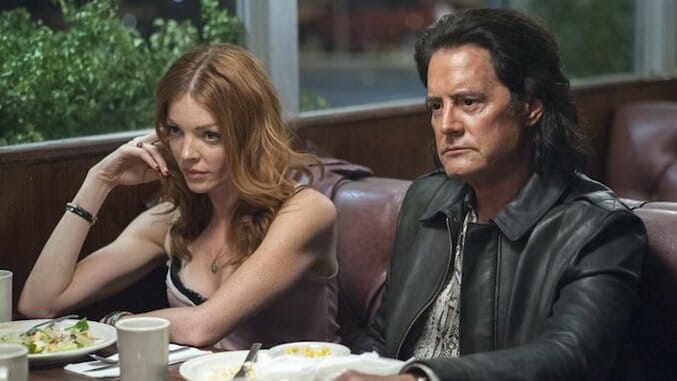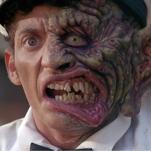In the Twin Peaks Premiere, David Lynch Re-Opens Its World—and Other Worlds, Too
("The Return," Parts I and II)
Suzanne Tenner/SHOWTIME
Well, The King of Eternal Return is back. And I’m going to say right now that in a major way there is no recapping David Lynch. Have you ever tried to explain a weird dream to your roommate? You know that glazed-over and uncomfortable look they get because you cannot really recapture why it felt so important and they really can’t understand what was in your head or why anyway? That. But let’s try to get the basics down. The locked-down cast and crew have had very little to say about what to expect from Showtime’s revival of Twin Peaks, but Lynch has been quoted a few times saying not to expect the show to stay in the small logging town—and it doesn’t.
Cooper’s soul is still stuck in the Black Lodge. His BOB-possessed doppelganger (Kyle MacLachlan) is on the loose in South Dakota, sporting long hair, a leather jacket and a terrifyingly blank expression, and he’s clearly up to nothing good. There’s a decapitated high school librarian—well, the librarian’s head and someone else’s body. Principal Bill Hastings (Matthew Lillard) is arrested for the murder, but says he has no memory of having been in the apartment, though it’s covered with his fingerprints. Bad Cooper seems to be involved, though it’s hard to say. The seedy Ray and Darya (George Griffith and Nicole LaLiberte) have been hired to take Bad Cooper out, but you try sneaking up on a paranormal evil. Darya doesn’t come out of this too well, by which I mean she is shot in cold blood by Bad Cooper. We’re a long way from cherry pie and coffee, guys.
In New York, a giant glass box that does nothing but must be constantly watched (Ben Rosenfeld is the lucky duck who gets to stare at it) couldn’t possibly be some metasymbolic TV, especially after some paranormal monster-thing comes out of it and wastes Rosenfeld and the girl who’s brought him lattes (!) while they’re making out in front of it. (Horror trope #1: Sex = Death. We never learn.)
And in the Lodge, we find Cooper being given three clues by the Giant (Carl Struycken)—again.
And the Man from Another Place / Dancing Dwarf keeps his word from 25 years ago (“When you see me next time, I won’t be me.”) And, well, let’s just say the words “Dude, I am not Groot” come to mind. The One-Armed Man is there. Leland Palmer (Ray Wise) shows up and begs Cooper to “find Laura.” (Oh, goodie!) Laura Palmer herself even comes back, in a moving and frightening mimicry of the dream scene where she whispers the name of her killer into Cooper’s ear and kisses him. Only this time, what she whispers causes his eyes to widen in horror, there’s no kiss, and she distorts and dissolves and evaporates out of the red room shrieking like a Fury.
The disparate narratives seem clearly connected, though it’s hard to tell at this early point which ones will take over. What does emerge as the clear star of the show is Lynch’s penchant for mixing bizarre humor (there’s a lot less of it here, in fact it’s largely pretty spare and bleak, but there’s a hilarious incompetent-cops sequence in South Dakota), melodrama, nostalgia, violence (especially against women, something he does in a way that’s extra-excruciating precisely because it is not cavalier), and the feeling of being trapped but coming full circle at the same time. We assume by the end that Good Cooper, who falls through the floor of the Black Lodge and seems to end up in some odd digitized form in the glass box in New York, is going to have to try to get Bad Cooper back into the Lodge so he can return to the world of the living. We assume this is going to be, well, complicated. And deeply symbolic and kind of incomprehensible yet somehow completely coherent once you detach from the narrative and look at the symbols.
But I admit it, for me, this was two hours of totally fascinating and brilliantly executed TV that really only became Twin Peaks again when we were actually in Twin Peaks. It was the return to the characters I remembered and the return to their landscape of unfulfilled longings that anchored me and made me really want more. Shelley (Mädchen Amick) and James (James Marshall) locking eyes over the crowd in the roadhouse, Dr. Jacoby (Russ Tamblyn) still in his 3-D glasses, taking delivery of… a bunch of shovels? Uh-oh. Ben Horne (Richard Beymer), who now apparently has respect for women, and his brother, Jerry (David Patrick Kelly), who apparently now runs a cannabis farm (of course). Sarah Palmer (Grace Zabriskie) alone in her haunted house watching a documentary of big cats devouring their prey. And an excruciatingly sweet couple of phone calls between Hawk (Michael Horse) and the clearly dying Log Lady (the late Catherine Coulson)—Log Lady Margaret warns him that what he is looking for has “something to do with your heritage,” (I bet it’s that owl cave ring from the movie; you?) and we see Hawk walking into the ring of sycamores in Glastonbury Grove and seeing ghostly, rippling red curtains.
No predictions yet, really. Lynch has re-opened this world (and referenced most of his other worlds) in his typically open-ended, highly interpretable way, and there are numerous directions this could take.
Read Amy Glynn’s Twin Peaks Season Three wine guide here.
Amy Glynn is a poet, essayist and fiction writer who really likes that you can multi-task by reviewing television and glasses of Cabernet simultaneously. She lives in the San Francisco Bay Area.







































